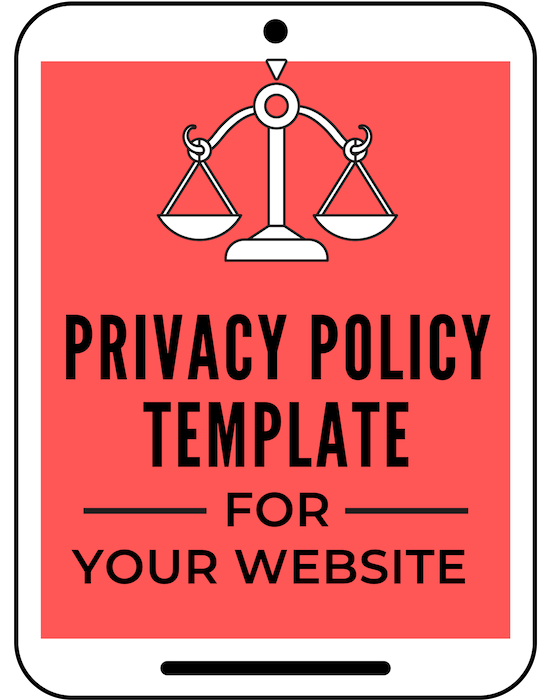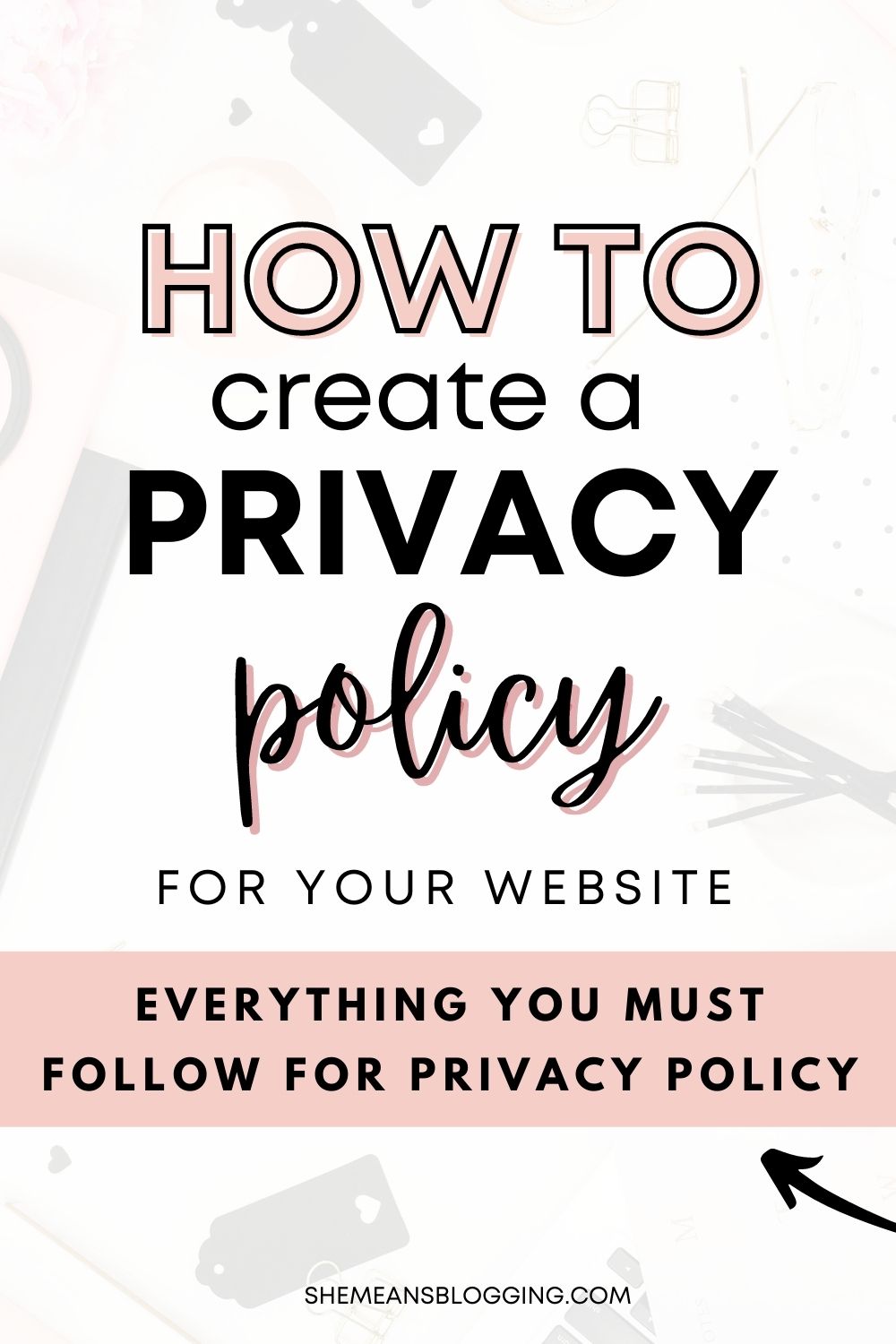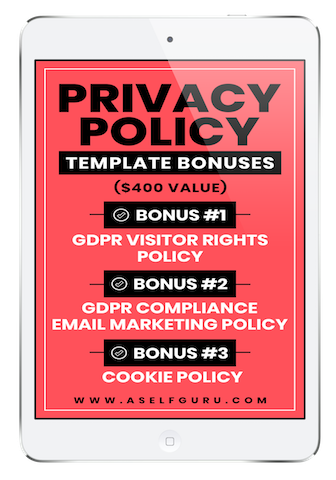If you are blogging or running an online business, you do need to add a privacy policy on your website. If you add links to other blogs, or affiliate programs, and use email marketing software or plugins then international laws require you to post a privacy policy online. If you work online, you need to know how to create a privacy policy for a website.
Legal pages are important legal documents to prevent lawsuits.
If you don’t have a privacy policy or other essential legal pages, your blog or online business is at risk of getting sued, or fined.

Do you know that most online businesses DON’T invest in legal documents and just don’t consider it necessary?
What happens?
Chances are that they might face legal problems with their online business. And, dealing with all legal matters is not that cheap.
The important thing here is to know that as a blogger or an entrepreneur, you need to make your website legally compliant.
That’s one simple way to protect your online business.
Affiliate Disclosure: This article contains affiliate links. If someone makes a purchase through affiliate links, I may earn a small compensation. For more, please read on to privacy policy and disclosure.
Quick navigation
What is a privacy policy?
A privacy policy is a legal document on your website that shows how you collect visitor’s data and personal information.
It further outlines how you are collecting the information and how are you using the visitor’s data.
This applies to any tool that collects the information of website users such as google analytics, email sign up forms, ads, plugins etc. It’s important to let your customers know that your website is collecting their information.
If you use any ad campaigns just like facebook ads where you use visitor’s data, it’s essential to mention it on your privacy policy.
Even the popular website analytics tool, Google analytics, requires a website privacy policy before you install and use the tool on your website. It’s included in their terms of service here.
Above that, it’s required by law.
And, How to create a privacy policy for a website?
Let’s learn more about it.
Is Privacy policy required by law?
I am not a lawyer and you should not consider this legal advice, but I’m quoting what a professional lawyer who writes legal pages for websites has to say about this.
You can get a professional privacy policy written by a lawyer here.
Is privacy policy required by law?
I asked a business lawyer who has said,
“Yes, it is required by law. You are legally required to have a proper Privacy Policy on your website that’s GDPR and CCPA compliant. Non-compliance with the GDPR results in some serious hefty fines of up to $20 million or 4% of the annual revenue from the prior year, whichever is greater.
You must know that violations of the CCPA are enforced by the California Attorney General, who can bring actions for civil penalties in the amount of $2,500 per violation or up to $7,500 per intentional violation!” – Amira, a business lawyer.
Many big companies are being sued for violating consumer’s data. The FTC has enforced serious punishments against companies like Google or Facebook. You can learn more from FTC document here.
This is nothing to scare you but as you can see, it’s so important to have a privacy policy for your website.
Whether you are a blogger, freelancer, entrepreneur – you need a privacy policy that clearly states the use of visitor’s data.
Be sure to get your privacy policy on your website.
Why do you need a privacy policy, and disclosure?
By now, it’s mostly clear why an online website owner needs to have a privacy policy and other legal documents like disclosure and terms and condition.
Here are some clear reasons why having a privacy policy is essential;
- To make your website complaint by law
- To prevent lawsuits and legal problems
- To give your customers and visitors peace of mind
- To show yourself as a professional blogger or entrepreneur
- To make companies trust you
- To not violate regulations
With disclosures, you are making sure to protect yourself from legal liabilities.
If you write sponsored posts, you need to have a sponsored disclaimer on your website. This ensures that you are not responsible legally for any content you get paid to write. These are all legalese to protect you from any legal problems.
In short, these are important legal documents to secure and legally protect you online.
We are not lawyers and we might not also understand the legal language.
That is why lawyer written legal templates are such lifesavers for all online business owners. Now, you can publish your privacy policy and every important legal page done in less than 15 minutes.
<<Check out this Privacy Policy Template>>

How to create a privacy policy for a website?
Now, you do want to ask,
“How to generate a privacy policy for your blog?”
Let me tell you that it’s not easy to write a privacy policy for your blog or website. Personally, I even don’t know what exactly to include.
It should also be written in an easy language that anyone can understand.
However, there is important information that requires to be included in a privacy policy.
- Be complaint with GDPR, CCPA and CAN SPAM Act
- Have a cookie policy
- Third-party policies
- The use of different tools, plugins, email platforms, ads etc
- Outline how the information is being collected on your webiste and what you are going to do with the personal data
- Children’s Online privacy protection rule
And, other important details.
As you can see, there is so much when it comes to writing a privacy policy for your website.
I definitely suggest getting this legal bunde that includes 3 legal pages including privacy policy, disclosure and terms and conditions.
Or, you can get privacy policy here.
PIN THE IMAGE BELOW! 🙂

Free Privacy Policy Templates: Should you use it?
As a new blogger, you don’t want to be misguided with any false information available.
There are several free privacy policy samples and even online privacy policy generators. But, wait! Are those policies protect you legally?
- Free legal templates usually don’t have legal provisions.
- The free legal templates are not specific, lacking important requirements.
- Most of these legal templates don’t have recent GDPR and CCPA provisions. In case you want to add these laws, you will have to pay them.
- These templates are not written by a real lawyer so there is no guarantee your business is legally safe.
- Free legal templates are not specifically created for bloggers and entrepreneurs. They don’t have all legal disclaimers as they are needed on our websites
What to do then?
Get a lawyer written privacy policy to avoid any errors. Or, you can get the whole legal bundle that comes with 3 legal templates, and other BONUSES.
<<Check out the Legal Bundle here>>
With this legal policy, you will have all legal disclaimers compliant with GDPR and CCPA provisions.
Privacy Policy Template
Whether you are a freelancer, blogger, online coach, entrepreneur – you need to publish a privacy policy on your website.
This is the privacy policy template that covers all important things required by law.
What’s included in this privacy policy template?
- It’s GDPR and CCPA compliant
- Quick and easily customizable
- 3 FREE bonuses (cookie policy, GDPR visitor right policy, and GDPR compliant email marketing policy) worth $400
<<CHECK OUT PRIVACY POLICY TEMPLATE HERE>>
Why using a privacy policy template is recommended?
- It’s easy to customize with your name and website details
- You can just add this privacy policy to your website by your own
- It takes less than 15 minutes
- And, it’s written by a lawyer so that you don’t have to worry what else to include
–> Get your privacy policy template here + 3 bonuses.
How to add a privacy policy to a wordpress blog?
It’s simple.
Step #1– Create a new page —> title it as ‘privacy policy’.
Step #2– Copy and paste the privacy policy template after adding your own name and website details.
Step #3– Drag the page on your website menu bar so that it’s easy to navigate.
I hope that’s simple.
—> Related post: 5 things to do right before starting a blog
3 Important Legal Pages To Protect Your Website
The 3 must-have legal pages are;
1- Privacy Policy
2- Disclaimer (It also includes the affiliate disclosure if you do affiliate marketing)
3- Terms and condition
Many bloggers struggle with writing these pages on their websites. I have no doubt why they shouldn’t be. There are some legal and all those tiny details we can’t even think of.
That is why this legal bundle is a smart investment in your blog business.
It saves so much time figuring out how to write and what to write. If you even get successful writing a legal page, you are not sure if it’s legally protecting your business.
I also suggest you to go through this legal guide for bloggers + entrepreneurs to understand why your online business needs to be protective.
This legal bundle is trusted and used by over 10,000 bloggers, and entrepreneurs. The reason everyone trusts these legal templates is that they are written by a professional lawyer. This saves so much time. You get free lifetime updates. And, it’s affordable.
–> Related: 20 important steps to do after installing wordpress
Privacy Policy for a website
I hope this clears all your questions and concerns regarding privacy policy templates.
What does a privacy policy template include?
How to generate a privacy policy?
How to write a privacy policy that actually protects your business?
Now, it’s simple to get a privacy policy template and upload it on your website. Or, continue figuring out how to write a privacy policy.
I do understand that many new bloggers don’t consider legal documents as investments but trust me, it is.
Sooner or later, you want to get this legal bundle to have a peace of mind for yourself and your users.


Leave a Reply